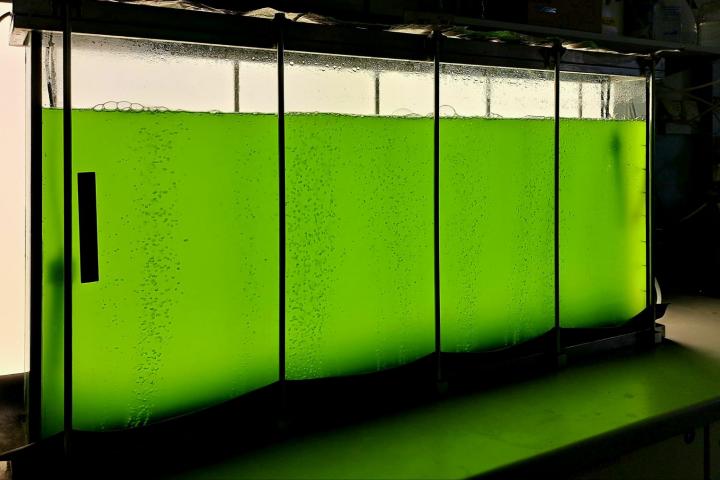
The METRO (Metabolic gases Transfer for Optimised algae growth) experiment aims to understand the processes in microgravity so that scientists can design a photobioreactor for use in space as the basis for a bioregenerative system.
Bioregenerative life support systems are a revolutionary approach to long-term space missions because they use living organisms such as algae, plants and microorganisms to recycle crew waste, produce oxygen and food, and absorb carbon dioxide, which is the basis of a sustainable spacecraft or station ecosystem.
Microgravity as a challenge for a normally functioning system
A key component of the bioregenerative system is the photobioreactor - a special device in which algae photosynthesise and convert carbon dioxide into oxygen and biomass by means of light. Although the design and operation of such a device has been well studied under terrestrial conditions, the engineering aspects of photobioreactors operating in microgravity remain largely unexplored. In fact, in the weightless state, the behaviour of liquids, such as bubble formation and their movement in the reactor, changes fundamentally, which significantly affects the efficiency of gas transfer between the culture medium and the atmosphere.
"Our experiment, which will head to the International Space Station, will focus on these phenomena. We will observe the behaviour of the liquid phase (algae culture medium) and the gas phase (ISS atmosphere), the transport of oxygen and carbon dioxide between them, and the dynamics of algae growth in weightlessness (microgravity). The data obtained will allow the design of future photobioreactors that will ensure crew self-sufficiency in deep space. Thanks to this data, it will be possible to design devices with an optimal shape and internal flow system that will maintain stable photosynthetic activity of algae and thus reliably ensure oxygen production and carbon dioxide recycling on board spacecraft heading to the Moon, Mars and beyond," explains Irena Brányiková from the Institute of Chemical Processes of the CAS, scientific leader of the METRO experiment.
METRO was selected as one of 14 projects that will participate in the mission of Czech astronaut Aleš Svoboda on his journey to the International Space Station ISS in 2027/2028.
The proposal for the METRO experiment was submitted by the CTU in Prague, which provides the physical implementation of the experiment in cooperation with the Institute of Chemical Processes of the CAS as a scientific partner. The other partners are esc Aerospace, s.r.o., which is responsible for the development of control electronics and software, and Serenity Valley Technologies, s.r.o., which is in charge of project management. The experiment will use the ICE Cubes platform on the International Space Station.
"The METRO project is an ideal meeting point between academia and the private sector. My colleague Brányiková from the Institute of Aeronautical Engineering of the CAS came up with an interesting idea and we and our partners realised that we have sufficient background and experience with ESA projects to be able to carry out such an experiment," summarises Jaroslav Kousal from the Department of Aerospace Engineering of Faculty of Mechanical Engineering of Czech Technical University in Prague, the project leader.
The Ministry of Transportation will send the list of recommended experiments together with additional conditions to the European Space Agency (ESA) in the coming days. The latter will then, in accordance with Czech guidelines, start negotiations with the project promoters in order to conclude implementation contracts with them by the beginning of the summer.
„Společně s celým výzkumným týmem máme opravdu velkou radost, že náš projekt METRO byl na cestu do vesmíru nominován. Tento krok pro nás znamená mimořádné ocenění náročné práce, kterou jsme věnovali přípravám. Těší mě, že díky této příležitosti můžeme zúročit rozsáhlou expertizu Ústavu chemických procesů AV ČR a našich partnerů, budovanou po mnoho let, a přispět tak k posouvání hranic vědeckého poznání a zároveň inspirovat mladou generaci k zájmu o kosmonautiku a přírodní vědy,“ říká Irena Brányiková.
"Together with the entire research team, we are really happy that our METRO project has been nominated for a trip to space. For us, this step is an extraordinary recognition of the hard work we have put into the preparations. I am pleased that thanks to this opportunity we can capitalize on the extensive expertise of the Institute of Chemical Processes of the CAS and our partners, built up over many years, and thus contribute to pushing the boundaries of scientific knowledge and at the same time inspire the younger generation to take an interest in astronautics and natural sciences," says Irena Brányiková.
The Ministry of Transportation coordinates the national project "Czech Journey to Space", which aims to support Czech science, innovation and education through participation in space missions in cooperation with other ministries, scientific institutions and industrial partners.